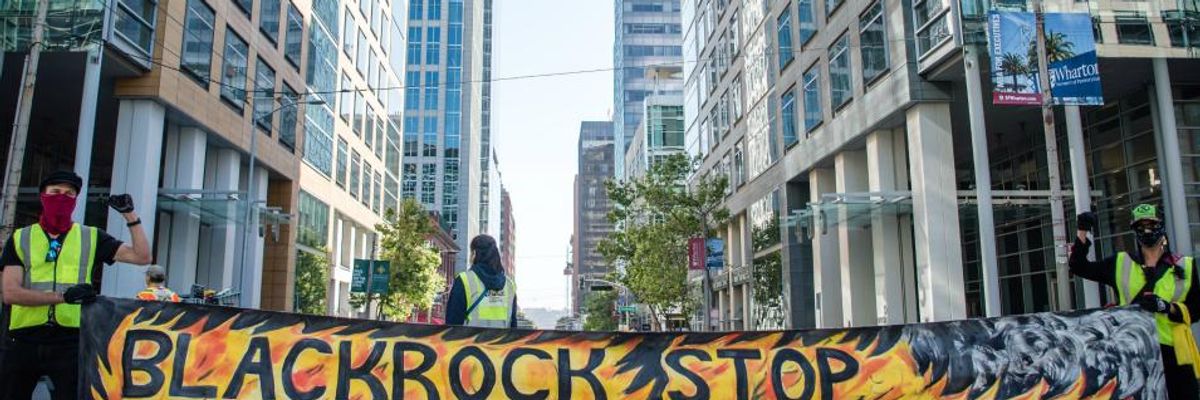As BlackRock--the world's biggest investor in fossil fuels and deforestation--held its annual shareholders meeting Thursday, climate activists came together in New York City, San Francisco, Brussels, and London for socially distanced demonstrations protesting the massive asset manager's "failure to live up to its rhetoric on climate change."
"BlackRock is responsible, through its irresponsible investments, for the suffering of vulnerable communities everywhere and we will not accept its hot air on climate."
--Jeff Conant, Friends of the Earth
Although the ongoing coronavirus pandemic prompted protesters to take precautions such as wearing face masks and limiting the number of participants, they still took to the streets to call out BlackRock's "hot air" on realigning its investment strategy with ensuring a habitable future planet--as founder and CEO Larry Fink had vowed to do in a January letter to the world's top chief executives.
Activists held banners near BlackRock locations in London and Brussels, while members of Friends of the Earth painted a mural and displayed banners outside the asset manager's San Francisco offices. In front of the firm's NYC headquarters, protesters floated a 10-foot hot air balloon with a banner that read "BlackRock: Hot Air on Climate."
"This message to BlackRock is in solidarity with essential workers and environmental defenders everywhere," Jeff Conant, senior international forest program director at Friends of the Earth, said in a statement about the protests. "Covid-19 is a terrifying manifestation of how quickly our global systems can break down, with the greatest burden falling on those already economically disenfranchised."
Referencing the economically devastating lockdowns that have been imposed around the world because of the pandemic this year, Conant added that "we may be hunkering down, but we will not be idle or silent. BlackRock is responsible, through its irresponsible investments, for the suffering of vulnerable communities everywhere and we will not accept its hot air on climate."
Friends of the Earth U.S. is part of a coalition of advocacy groups that in January launched Stop the Money Pipeline, a campaign that pressures banks, insurers, and asset managers to stop financing climate destruction. The initiative--which identifies BlackRock as a top target--kicked off just as the Wall Street titan announced it was joining the Climate Action 100+ investor initiative.
At the time, members of the BlackRock's Big Problem network called the move a "first step in the right direction" but urged the firm to "go beyond words and actually make meaningful changes to the way it wields its power." The message from activists on Thursday was that "so far BlackRock's big talk on climate change is a lot of hot air," in the words of Pete Sikora from New York Communities for Change (NYCC).
"Fink can't hide behind rhetoric without meaningful climate action. That's why we brought a hot air balloon to BlackRock's headquarters today," said Sikora. "Covid is a horror for our city. It is also a preview of the accelerating climate crisis, which BlackRock is fueling by putting more money into fossil fuels than any other investor."
The protests came after a virtual "People's Assembly on BlackRock" on Wednesday featuring various elected officials and Indigenous and community leaders. During the event, members of the BlackRock's Big Problem network went over questions they submitted for BlackRock's annual meeting, some of which Fink addressed Thursday.
In response, Moira Birss of Amazon Watch said that "Larry Fink's answers to our questions this morning show that BlackRock's actions just don't live up to the urgency of the climate crisis."
"While BlackRock is tweaking its investment models and talking about transparency, the Bay of Bengal is being hammered by a hurricane, Michigan is flooding after record storms, and fires in the Amazon this summer are predicted to be worse than ever," she said. "The time for rhetoric and baby steps is long gone. BlackRock has to make substantial changes to its entire investment model in order to be the climate leader it claims to be."
BlackRock was not alone in facing coronavirus-conscious protests from climate activists during shareholder meetings this week. As Common Dreams reported Tuesday, both oil giant Royal Dutch Shell and multinational investment bank JPMorgan Chase--another top target of Stop the Money Pipeline as the bank that provides the most financing for the fossil fuel industry--also saw various actions condemning their contributions to climate chaos.




